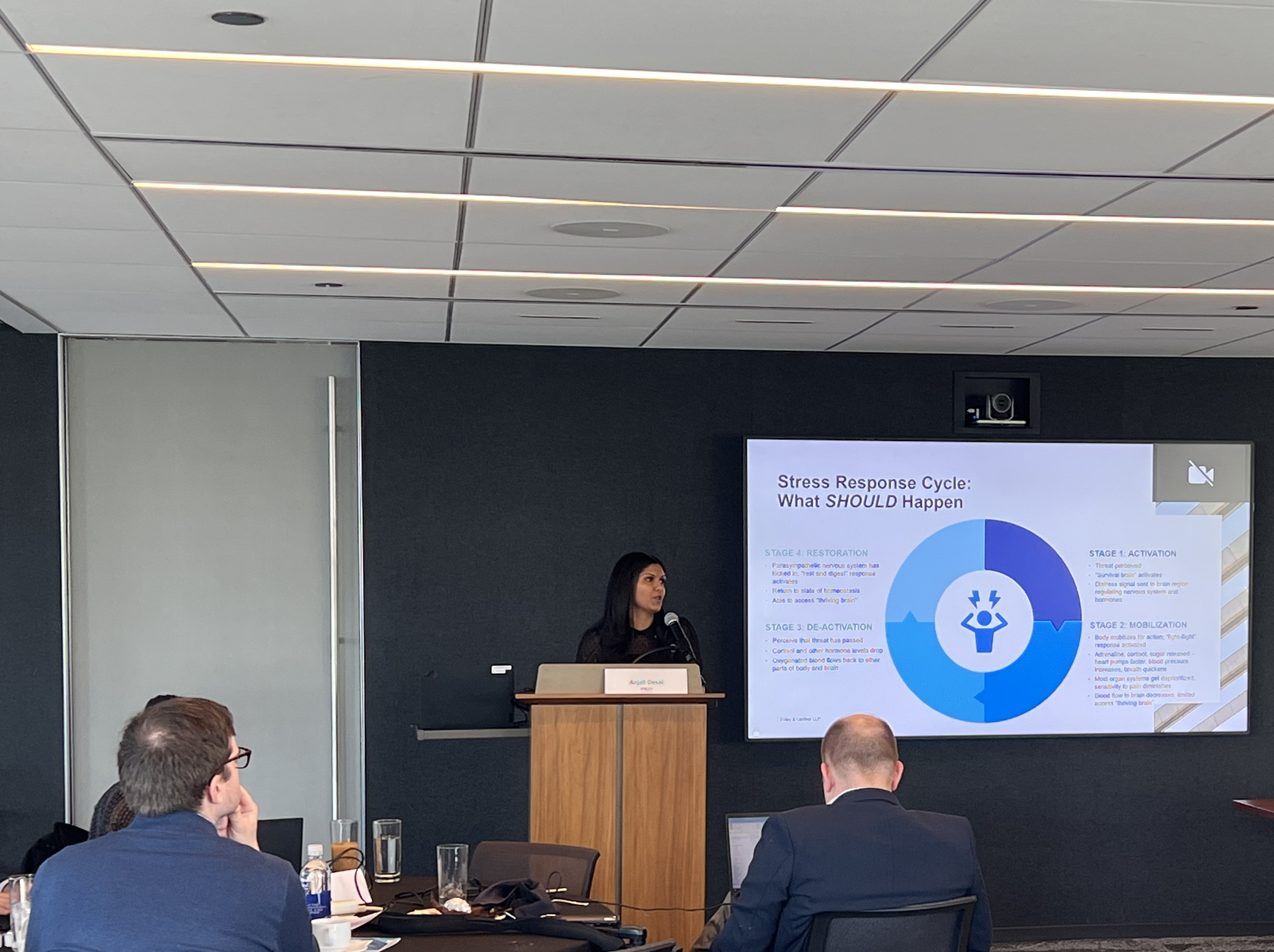The topic of mental health and well-being has been front and center for lawyers and law students in recent years after numerous studies have revealed high rates of substance use, addiction, and mental health disorders in the legal profession. However, strategies for developing resilience to cope with the stress that comes with preparing for the practice of law and ultimately being in a demanding client-service profession often hasn’t been taught as part of initial or continuing legal education. Stress can play out in various unhealthy or unintended ways when left unaddressed, making it invaluable for current and future lawyers to learn how to build healthier habits to manage stress.

During April, which is recognized as National Stress Awareness Month, Foley hosted programs for both internal and external audiences on the topic of stress in the legal profession. Led by our Director of Coaching Anjali Desai, the content, exercises, and discussion were intended to help participants better understand and navigate stress to build a more resilient mindset.
Here are 10 key takeaways from these programs:
- Not properly dealing with stress can have a huge impact on your physical and mental health. The good news is neuroscience research shows that with practice you can intentionally rewire your brain to develop a more resilient mindset, which will help you constructively handle the pressures associated with being a lawyer or law student.
- Even just anticipating that something will be stressful — whether it be an upcoming exam or an upcoming trial ― can affect you in the same way as if you are actually experiencing the stressful event, raising your heart rate and releasing stress hormones.
- In addition to its other known effects, chronic stress can impact your cognitive abilities in the short- and long-term. It affects your ability to remain focused and concentrate, recall information, make good decisions and use your judgment, and think clearly through complex issues — all critical things for lawyers and law students. Chronic stress can also eventually lead to a lack of motivation or burnout and engaging in unhealthy coping mechanisms.
- When you encounter a stressor, you should experience a stress response cycle that ultimately helps you return to a state of homeostasis. However, many times you’re unconsciously perceiving or anticipating everyday situations to be threats, and you get “stuck” or “locked” in the cycle and do not complete it. This prevents you from returning to a state of restoration and relaxation because your stress response remains chronically activated.
- You must actually do something to create a physiological shift in your body and complete the stress response cycle — it’s not an intellectual decision. Your body will tell you when you’ve completed the cycle, either through a shift in mood or release of physical tension.
- Physical activity is the single most efficient strategy to deactivate your stress response. Other common ways include deep breathing, laughter, time spent in nature, friendly social interactions and connecting with others, affection, crying, and creative expression.
- Lawyers spend their careers “thinking like a lawyer” after being taught to do so as law students — in other words, to focus on problems and what could go wrong, to deconstruct things, and see all the flaws and weaknesses in something. Basically, negative thinking and pessimism appear somewhat necessary to succeed in school and the legal profession.
- Such negative thoughts can be “invisible” stressors that are ever-present in the background keeping your stress response activated. Becoming aware of the content and quality of your thoughts, and making conscious what’s happening at the subconscious level, can help you take control over your thoughts.
- When you embrace stressful situations as a challenge (instead of perceiving them as a threat), you see them as a way to learn, grow, and develop mastery. Research shows that if you have this type of “growth” mindset, where you believe you are capable of growing and improving, it can result in higher achievement and more resilience against setbacks. To help you shift from perceiving a threat to embracing a challenge, you can reframe anxiety as excitement and focus on the resources available to you to help address the situation.
- You have to be intentional and proactive about how you build your resilience to stress. Being passive or reactive can ultimately lead to more stress and have continued adverse effects on your performance, health, and overall satisfaction and well-being.
At Foley, people are our most valuable asset. We invite everyone to be their best self, and we continually work to cultivate an environment that promotes professional satisfaction, health, and well-being.
If you would like to hear how we’re doing this, check out Episode 84 of The Path & The Practice, one of our most popular podcasts. It highlights the many resources Foley provides to support our people, and more importantly, features a candid discussion of the obstacles lawyers may face throughout their career and the tools that can help them navigate the stress that can result.
